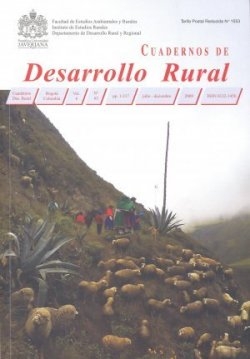Abstract
El artículo analiza el papel que desempeñó la siembra de la caña de azúcar y la destilaciónde aguardientes para la economía del Estado Soberano de Bolívar. Se sostiene que a diferencia
del tabaco y el algodón, la caña de azúcar, por medio del comercio de aguardiente, consolidó
un mercado interno y dinamizó el comercio entre las provincias y comarcas del Estado. Lo
anterior llevó a que el Estado estableciera el impuesto a la destilación y venta de aguardientes,
convirtiéndose en uno de los impuestos más significativos para el sostenimiento de la
administración pública, después de los impuestos al degüello y sobre la renta.
Cuadernos de Desarrollo Ruralis registered under a Creative Commons Attribution 4.0 International Public License. Thus, this work may be reproduced, distributed, and publicly shared in digital format, as long as the names of the authors and Pontificia Universidad Javeriana are acknowledged. Others are allowed to quote, adapt, transform, auto-archive, republish, and create based on this material, for any purpose (even commercial ones), provided the authorship is duly acknowledged, a link to the original work is provided, and it is specified if changes have been made. Pontificia Universidad Javeriana does not hold the rights of published works and the authors are solely responsible for the contents of their works; they keep the moral, intellectual, privacy, and publicity rights.
Approving the intervention of the work (review, copy-editing, translation, layout) and the following outreach, are granted through an use license and not through an assignment of rights. This means the journal and Pontificia Universidad Javeriana cannot be held responsible for any ethical malpractice by the authors. As a consequence of the protection granted by the use license, the journal is not required to publish recantations or modify information already published, unless the errata stems from the editorial management process. Publishing contents in this journal does not generate royalties for contributors.


